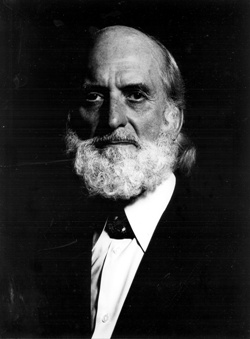Fra minnestunden i 2005:

Portrait by Morten Krogvold
Professor Jeremi Wasiutyński
In Memoriam
The Embassy of Poland in Oslo, 14th April, 2005
Jeg ønsker dere alle sammen hjertelig velkommen i Den polske ambassade. Det er en ære for meg at venner av professor Jeremi Wasiutyński ønsker å samle seg nettopp her, i ambassaden, på dette lille stykke av Polen, hans første fedreland. Jeg takker så mye Ingeborg Solbrekken og Sissel Klokkhammer for dette initiativet og all hjelp å arrangere denne minnekvelden.
Professor Jeremi Wasiutyński was a son of a Poland lost. He was one of the last representatives of the Polish nobility, its culture, manners and heritage that have perished with History’s brown and red fires. Born and educated in Poland he treated the privileges of his family status, upbringing and culture with the deep sense of responsibility, hard work and independence of mind. “Noblesse oblige” found but few followers like Jeremi Wasiutyński.
He was certainly in sincere debt to Norway for what the country offered to him. He was certainly grateful to have found here loyal and loving friends and invaluable associates. He loved Norway’s nature and culture.
His intellect and creative works certainly belong to European treasures of Renaissance, modern humanism and sciences.
But when one met him – and I have had this fortunate privilege – one immediately felt the sense of being with a proud and old-fashioned Polish gentleman, an exceptional figure from another land and another epoch. He certainly testified to the best qualities of this bygone realm, which now can only be found in the music of his favourite Chopin, in the old portraits of his severe forefathers, and especially in belle-lettres.
I am told that a beloved piece of literature to which Professor
Wasiutyński used to return in the moments of nostalgia and sadness was an
epic poem, Pan Tadeusz, by our great Romantic poet Adam Mickiewicz, written in
1834. It is a moving tale about the life of provincial Polish gentry. The poet
himself regarded this work as an island to escape from “European noise”.
Prof. Wasiutyński's favourite escape was a chapter called “Diplomacy and
Hunting”, with its famous description of a horn music played to start a hunting
party. It is a lovely poetic piece combining the images of music, the
surrounding forest and hunting customs. It ends with the well-known refrain
about the performance being stopped but the sound of music being still heard as
an echo.
In memory of professor Jeremi Wasiutyński, and those he had left in the land of his real and imagined past, let me read a passage from the poem – the homeland of his ever present memory.
Andrzej Jaroszynski
Polish Ambassador
<11.12.07; picture added 28.10.10>